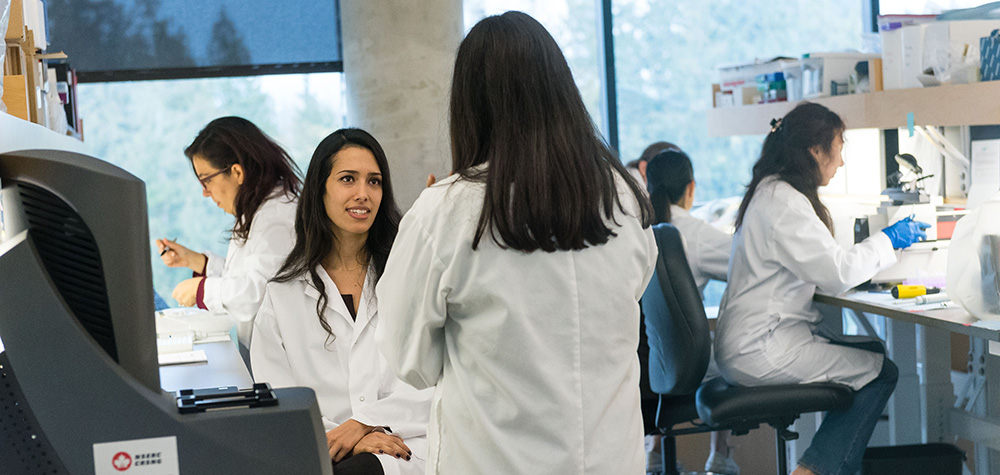
Rand Eid (facing forward, left) at work in the Laboratory of Behavioural Neuroendocrinology (Galea Lab) at the Djavad Mowafaghian Centre for Brain Health at UBC. Image credit: Paul Joseph/UBC.
Pregnancy and motherhood don’t just lead to “mom brain,” a sort of fogginess that occurs during pregnancy and in the months post-partum; in fact, reproductive experiences may change the trajectory of women’s aging across the lifespan, finds new research from PhD candidate Rand Eid and colleagues in Dr. Liisa Galea’s and Dr. Joanne Weinberg’s labs in UBC’s Faculty of Medicine.
Published online last week in the journal Neurobiology of Aging, Eid and her team found that adult hippocampal neurogenesis—the process by which new neurons are formed in the hippocampus, a brain region involved in cognitive and emotional function—slows during pregnancy and the post-partum period, perhaps contributing to the cognitive and emotional changes that many new moms experience. However, in middle age, mothers seem to experience an increase in neurogenesis, a time when non-mothers experience a steep decline.
“Evidence is emerging that pregnancy and motherhood alter disease susceptibility later in life in a spectrum of disorders including diabetes, breast cancers and even dementia,” says Dr. Galea. “Understanding how the brain ages, and the relationship between immune and neuroplastic markers, may help researchers shed some light on what happens during a female reproductive experience that alters the course of aging and disease susceptibility.”
Brain’s immune cells change shape in the postpartum period
During gestation, a mother’s immune system adapts in order to maintain the pregnancy and support the developing fetus, but little research exists on neuroimmune changes associated with motherhood. Because neuroimmune processes are also involved in emotional and cognitive regulation, Eid and colleagues studied microglia, the brain’s immune cells, in the context of motherhood. They found that in rats, microglia change shape in the postpartum period, retracting their processes which suggests an increase in brain inflammation during that time.
“We are not sure what the functional significance of these changes to the brain’s immune cells might be, but we question whether there is a link between inflammation in the brain and postpartum depression in some mothers,” says Eid.
Pregnancy and motherhood change the number of new hippocampal neurons in the short and long term
Studies like this one are important as they show that sex-specific experiences alter the trajectory of brain aging.
Rand Eid
PhD candidate
They also found that rats that were mothers showed a decrease in neurogenesis—the production of new neurons in the hippocampus—during pregnancy and immediately afterward. Interestingly, as these mothers aged, they showed even more neurogenesis than rats that had never given birth.
“This finding is exciting because neurogenesis in the hippocampus has been linked to learning and memory, and there is evidence to suggest that motherhood can impact cognitive function later in life,” Eid says.
For Eid, these insights were important and represented further evidence that motherhood has a lasting influence on female physiology in clinically relevant ways.
“Beyond studying differences between males and females, sex-specific factors such as motherhood should be taken into consideration as a long term health factor for women,” says Eid. “Studies like this one are important as they show that sex-specific experiences alter the trajectory of brain aging.”
A version of this story originally appeared on the Djavad Mowafaghian Centre for Brain Health website.